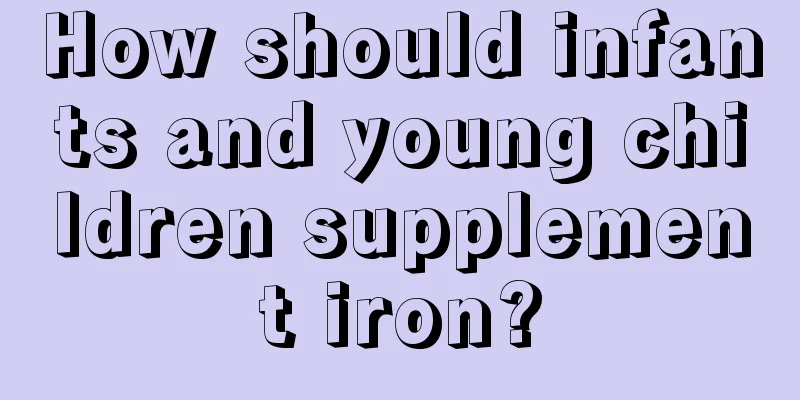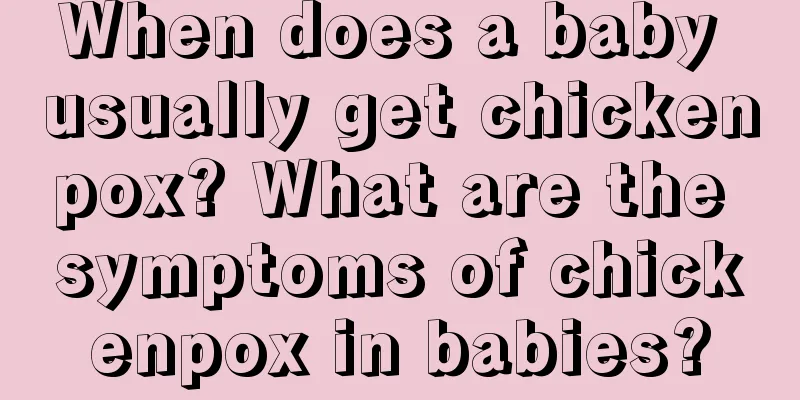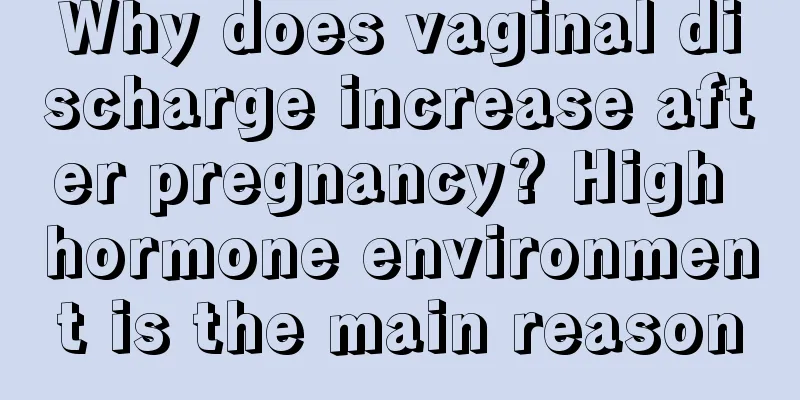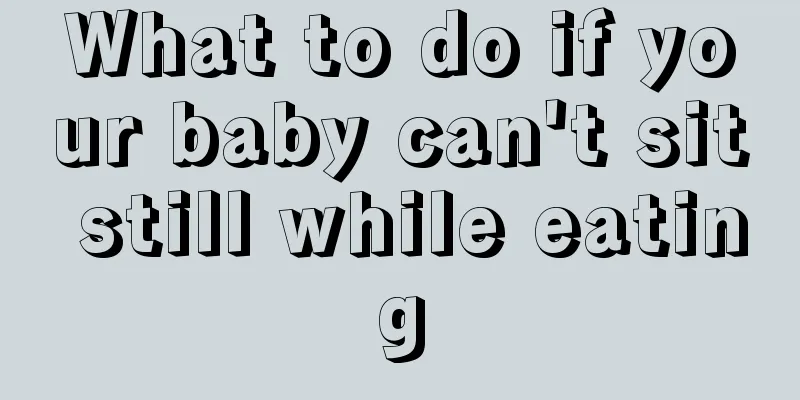How should infants and young children supplement iron?

|
Calcium, iron, zinc, selenium and vitamins are essential to the human body. So, how can infants and young children supplement iron? How to supplement iron for infants and young childrenGenerally speaking, iron deficiency in children is caused by parents not adding iron-containing complementary foods to their children after 6 months of age. Some children may have mild anemia from 1 week to 2 to 3 months after birth. This may be a temporary physiological anemia caused by the hemoglobin level being temporarily lower than normal during the growth and development of the baby. In this case, no special iron supplementation is usually required. After 4-6 months, children start to add complementary foods, but the complementary foods are relatively monotonous. When the children grow up a little bit, some children have unreasonable nutritional structures such as picky eating, or when the children suffer from intestinal parasitic diseases, chronic diarrhea or indigestion, which affect the absorption and utilization of iron, resulting in iron intake cannot meet the body's needs and gradually show signs of iron deficiency. When a child has iron deficiency anemia, some physical signs will be given: pale complexion, dry skin, reddish or pale conjunctiva and lips, etc. Children with iron deficiency anemia often have a poor appetite and look listless. Testing hemoglobin content and red blood cell count is currently a reliable basis for diagnosing anemia. When iron deficiency anemia is diagnosed, if the degree is mild, it is generally recommended to improve the anemia through reasonable dietary adjustments. For children aged 6 months, iron-fortified rice noodles can be added, and for older children, meat, egg yolks, animal liver, animal blood, etc. are all iron-rich foods that can be eaten more. Of course, iron supplementation is not "the more the better". If you take too much iron, you may experience symptoms such as nausea, vomiting, loss of appetite, abdominal pain, constipation, etc., which will affect your physical health and development. Causes of iron deficiency in infants1. Insufficient iron from the mother Before the baby leaves the mother's body, it can obtain iron from the mother through the placenta. Especially in the three months before delivery, the fetus will absorb a large amount of iron from the mother and store it in its own body for use after leaving the mother's body. Generally speaking, the iron obtained by the fetus from the mother can meet the needs of hemoglobin synthesis within six months after the baby is born. If the pregnant woman suffers from severe iron deficiency anemia during pregnancy, the iron content stored in the baby will decrease. If there are multiple births or premature fetuses, the iron storage will be insufficient, which will eventually lead to iron deficiency in the baby. 2. Insufficient iron absorption Whether in breast milk or formula, the iron content cannot reach the amount required for infant metabolism, especially after six months, the baby's demand for iron will gradually increase. If the baby relies solely on breast milk and formula, iron deficiency anemia will occur more easily over time. Therefore, it is necessary to add iron-rich complementary foods to the baby in time. 3. Iron is in short supply Children reach a critical period of physical development at around one year old, and their growth rate is three times that of when they are just born. The faster the body develops, the more iron is needed. If iron absorption cannot keep up with the speed of physical development, and there is little iron in the diet, the baby will suffer from iron deficiency anemia, especially premature babies. 4. Iron Absorption Impairment If the baby is unwell and causes long-term diarrhea, intestinal malabsorption, etc., it will affect the body's absorption of iron, which will also lead to iron deficiency anemia. Symptoms of iron deficiency in babies1. Look at the mood: the mood is volatile, irritable, angry or indifferent. 2. Eat: Decreased appetite, loss of appetite, easy thirst during meals, and request to drink water. 3. Look at the face: often lack of energy, pale complexion, nails, light red or pale lips and tongue. 4. Behavior: Often easily tired, less active, fatigued and sleepy, weak legs and feet; poor concentration, often distracted when listening to stories. 5. See a doctor: Because of low immune function, babies are more susceptible to various infectious diseases. Careful mothers will find that their babies will not be able to escape the flu every time it comes. The dangers of iron deficiency in infants and young children1. Iron deficiency can slow down the baby's growth and development, resulting in the baby's short height, reduced motor skills and poor coordination. 2. If the baby is iron deficient for a long time, the baby's immunity and anti-infection ability will be reduced, the baby's resistance is poor and it is easy to get sick. Iron deficiency anemia caused by iron deficiency can seriously affect the baby's life and health. 3. Long-term iron deficiency can also cause poor memory, intellectual decline, inattention, slow reaction, and affect the baby's cognitive development. Therefore, iron deficiency will make the baby stupid! 4. Make the baby feel listless, irritable, angry, unhappy, and affect the baby's mood. |
<<: What are the precautions for babies to eat eggs? 5 precautions to pay attention to
>>: Will baby's birthmarks disappear automatically? Different birthmarks disappear in different ways
Recommend
What happens if a newborn baby has diarrhea after eating breast milk? What should I do if a newborn baby has diarrhea after eating breast milk?
People often say that babies who drink breast mil...
What temperature is suitable for babies in winter? Can I turn on the air conditioner when my baby has a fever?
It is very cold in winter, and everyone uses air ...
When to use baby shaping pillow? What brand of baby shaping pillow is good?
Most mothers know that because babies are very sm...
Are pregnant women with twins more likely to have premature births?
Parents are very happy when a baby is pregnant, e...
Should pregnant women with diabetes give birth early? Should pregnant women with diabetes be hospitalized?
Diabetes is a very common disease nowadays. Many ...
Can I use enema for postpartum constipation? Pay attention to the frequency of use
Many mothers who have just given birth are troubl...
How to lose weight during breastfeeding? Diet for weight loss during breastfeeding
Scientific weight loss during lactation can help ...
What kind of bottle is suitable for warming breast milk? Why can't you use a microwave to warm breast milk?
In order to save time and effort, many mothers ch...
Do scented candles help you sleep? Which aromatherapy helps you sleep?
Aromatherapy candles are a very popular product n...
How many days after ovulation can pregnancy be detected?
Having a healthy baby is the wish of every couple...
Will children mature early if they eat flaxseed oil? What are the benefits of eating flaxseed oil for babies?
Flaxseed oil is a kind of edible oil with high nu...
Children's Bedtime Story: Soothing the Grumpy Princess
Everyone has bad tempers sometimes, but you shoul...
What is amniotic fluid embolism? How to prevent it?
Amniotic fluid embolism is the most dangerous thi...
What should pregnant women pay attention to when eating meat? How to eat meat healthily during pregnancy
There are many kinds of meat, and different meats...
What should I do if my newborn's belly button bleeds? Will it hurt if my newborn's belly button falls off?
From the moment the baby is born, mothers are wor...









